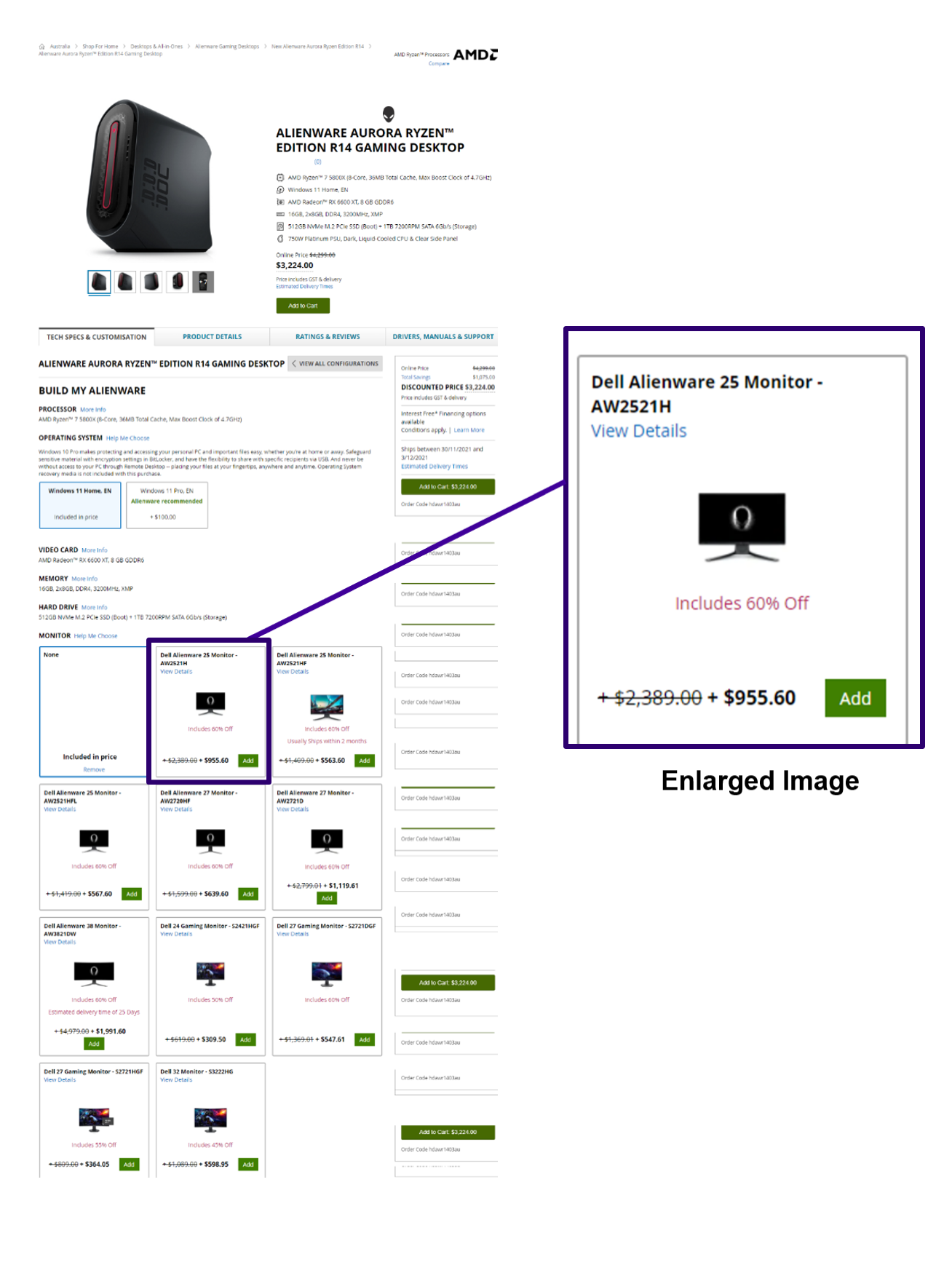Aussie consumer watchdog is taking Dell to court over misleading discounts
Monitor offers were "inflated", according to the ACCC

Despite making some of the best laptops money can buy, Dell is set for a Federal Court date with Aussie consumer watchdog ACCC, following allegations the tech company’s Australian online store made “false or misleading representations regarding the price of monitors”.
In a statement, the ACCC alleges that between August 2019 and December 2021, Dell aimed to entice consumers to add monitors to the purchase of a computer “by displaying false or misleading discounts”. As per the watchdog’s alleged findings, the prices of monitors as an add-on were often more expensive than if the monitor was bought separately.
Dell’s online store in Australia has the usual RRP stricken out and, the ACCC claims, these strikethrough prices were often inflated to make consumers think the saving was greater than reality. Deal markers such as ‘total savings’ and ‘discounted price’ are among those the consumer watchdog alleges Dell Australia used to mislead its customers in an attempt to encourage them to add a monitor to their computer purchase.
“Cases involving allegations of misleading ‘was/now’ pricing by large retailers of consumer goods are a priority for the ACCC,” the watchdog’s Commissioner Liz Carver said. “Businesses should be well aware of their legal requirements and should have effective compliance programs in place to prevent this type of consumer harm.”
The ACCC also added that the alleged misleading of consumers occurring during periods of Covid lockdowns were of particular concern, as parents of schoolchildren forced into home learning were increasingly looking for PCs and PC-related tech out of necessity and therefore more vulnerable to being misled.
“While the total number of misled consumers is unknown, we believe many thousands of consumers were sold an add-on monitor which was advertised with a representation that an inflated discount applied,” Carver added.

Will other countries catch up with Australia's consumer rights crackdown?
Dell's Australian storefront might be the latest retailer to run afoul of the Australian consumer watchdog as a result of allegedly misleading consumers, but it is hardly the first. In August, Google found itself in hot water when it was ordered by the Australian Federal Court to pay AU$60 million in penalties following allegations of “making misleading representations to consumers about the collection and use of their personal location data on Android phones between January 2017 and December 2018”.
Get daily insight, inspiration and deals in your inbox
Sign up for breaking news, reviews, opinion, top tech deals, and more.
Google’s significant payout followed a similar finding against Samsung Australia in June, who was ordered to pay AU$14 million after the South Korean tech giant admitted to misleading consumers about the water resistance for some of its Samsung Galaxy smartphones.
And of course late in October, Google-owned smartwatch manufacturer Fitbit was the one to run afoul of the Australian watchdog following allegations it had been misleading consumers about their refund and replacement rights for Fitbit products.
The ACCC’s willingness to act on behalf of consumer’s rights and draw a line in the sand on attempts to mislead Aussies is a welcome service, particularly now when the cost of living continues to rise and purchases eat away at everyone’s budgets.
The ACCC’s actions also further serve as handy examples for countries like the US and UK, where the powers of the relevant consumer watchdogs are notoriously less effective and not encouraged to act with proportionate force as a result of various red tape barriers. As one example, the Federal Trade Commission (FTC) in the US in late October announced plans to consider cracking down harder on retailers posting fake or misleading reviews or suppressing negative consumer reviews. Engaging in the practise of posting fake reviews and suppressing negative reviews is already illegal in the US but not a lot has come of it. FTC’s Bureau of Consumer Protection Director Samuel Levine said, "We’re exploring whether a rule that would trigger stiff civil penalties for violators would make the market fairer for consumers and honest businesses."
In our view, the inference to draw is that some retailers are openly willing to flout existing regulations and laws in attempts to mislead consumers and seemingly unafraid of facing real consequences. It would be hoped that lessons learned from the newfound crackdowns in Australia will begin to make their way overseas.
For retailers, the importance of transparency and fair practice in dealing with consumers is invaluable to consumers at the best of times, but becomes even more imperative in times of financial crisis such as now.

James is a senior journalist with the TechRadar Australia team, covering news, analysis and reviews in the worlds of tech and the web with a particular focus on smartphones, TVs and home entertainment, AR/VR, gaming and digital behaviour trends. He has worked for over six years in broadcast, digital and print journalism in Australia and also spent time as a nationally recognised academic specialising in social and digital behaviour trends. In his spare time, he can typically be found bouncing between one of a number of gaming platforms or watching anything horror.